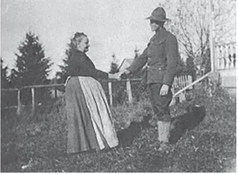Berger shares his father’s World War I service stories


Note: With the recent Nov. 11 Veterans Day ceremonies having their roots in Armistice Day marking the end of World War I, amateur historian John Berger of Sacramento, Calif. sh...


Note: With the recent Nov. 11 Veterans Day ceremonies having their roots in Armistice Day marking the end of World War I, amateur historian John Berger of Sacramento, Calif. sh...